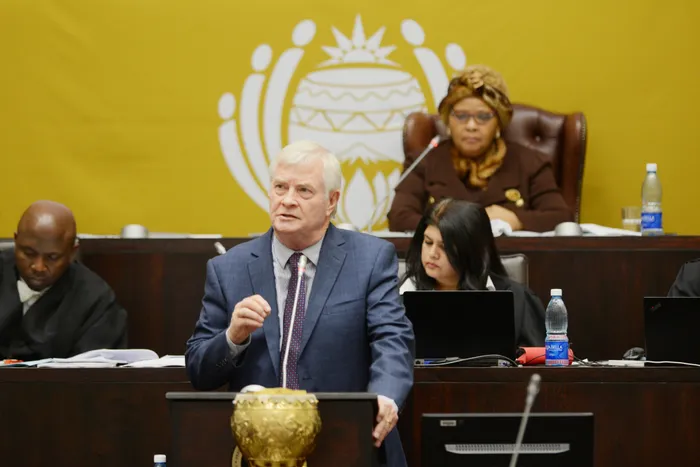Minister Groenewald wants Correctional Services back in state security structures

Correctional Services Minister Pieter Groenewald says his department is doing its level best to explore alternative revenue streams to not to be solely reliant on the fiscus while they face real and pressing financial and operational constraints.
Image: Armand Hough / Independent Newspapers
Correctional Services Minister Pieter Gronewald has formally requested President Cyril Ramaphosa to give consideration to restoring his department in the state security governance structures.
Groenewald said should his request be granted, this would yield more appropriate budget alignment with the department’s core security and enhanced access to critical intelligence and security technologies, among other things.
“We currently face numerous regulatory obstacles, which result in the department not being able to utilise signal jammers or intercept communication. If we succeed with being restored to a state security structure, it will greatly assist in the fight against organised criminal activities which are taking place in our correctional facilities,” he said.
He made the statement when he tabled the department’s R29 billion budget in the National Assembly.
Groenewald also said his department was doing its level best to explore alternative revenue streams to not to be solely reliant on the fiscus while they face real and pressing financial and operational constraints.
“The capital budget shortfall of R222 million undermines our ability to conduct infrastructure upgrades and critical maintenance. The escalating cost of food, fueled by inflation and the growing number of inmates, including a sharp increase in foreign nationals, adds another layer of financial strain,” he said.
“We are also hamstrung by above-Consumer Price Index increases in municipal tariffs, particularly for electricity, water, and sanitation. Fixed costs linked to our Public-Private Partnership (PPP) correctional facilities leave no room for reprioritisation, and the devolution of maintenance responsibilities from the Department of Public Works and Infrastructure, without corresponding budget support, has created a funding gap of R154 million.”
Groenewald added that their digital transformation agenda was also under threat as infrastructure modernisation was both urgent and underfunded.
“The planned recruitment of over 9,000 security officials, which would significantly improve safety and supervision in our centres, also remains underfunded. However, we continue to engage with National Treasury and remain steadfast in our pursuit of sustainable solutions.”
The minister urged departments to consider fulfilling their furniture and related supply needs through the Department of Correctional Services.
“This request is both legally supported and aligned with the broader goals of government cost-efficiency, skills development, and rehabilitation."
Groenewald told the MPs that the department was actively working on reviewing the parole system.
“It is a moral imperative that this administration finalises the review in the interest of all. We still see too many headlines and reports concerning parolees causing harm to our communities. An excessive number of medium to high-risk offenders are being recommended for parole. Once again, we must not allow the citizens of South Africa to bear the burden of this risk.”
He lamented the problem of more than 60,000 remand detainees in prisons, which pushed the number of beds needed to 166,000.
“Currently, we have sufficient bed space for all sentenced offenders. With 107,067 bed spaces, the 104,550 sentenced inmates are accommodated.”
He said the remand detainees were a significant contributor to the prisons’ overcrowding.
“At present, 2,530 remand detainees remain in custody simply because they cannot afford bail set at R1,000 or less, despite having been granted bail by our courts.”
He welcomed the pilot launch of an independent Bail Fund, an initiative that will advance bail only for those who have already been deemed eligible by the courts.
Groenewald noted with concern the cost-drivers that were linked to foreign national offenders.
“The South African taxpayer foots the bill for just over 24,000 foreign nationals. Calculated at R463 per day, this results in an expense of R11,112 000 per day. We are currently exploring various solutions, including diplomatic approaches.”
Related Topics: